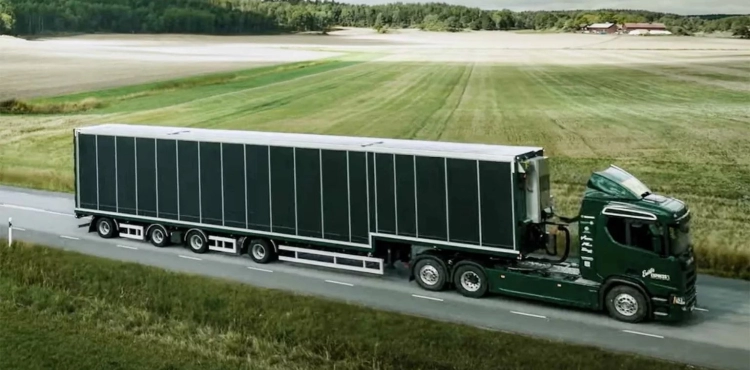The Swedish company Scania has unveiled the world's first hybrid truck covered with solar panels, which reduces operational costs and carbon dioxide emissions resulting from heavy transportation, because the truck produces energy itself.
Scania aims to drive the shift towards a sustainable transport system, as solar panels have never been used to generate power for a truck's powertrain.
The truck's 18-metre-long trailer is almost entirely covered in solar panels connected to an on-board electrical system. Solar energy gives the hybrid truck a long driving range of up to 5,000 km per year in Sweden.
In countries such as Spain, the truck can double the amount of solar energy, thus increasing the driving range compared to Swedish conditions.
The hybrid truck is being tested in a research project to examine the amount of solar energy it is capable of generating, and the extent to which carbon dioxide emissions can be reduced through the use of attached photovoltaic panels.
The project also studies how trucks interact with the power grid, and presents new models of what might happen if multiple trucks like these connect to the power grid.
The hybrid truck drives silently along Scandinavian country roads. “If you can make it work in Sweden on solar energy, you can make it work anywhere,” said Erik Falkgrim, Scania's solar truck development project manager. “If the technology is applicable in the Nordic countries, this would confirm the viability of the project on a large scale.”
Inspired by advances in lithium-ion battery technology, Scania's Research and Innovation department thought of a way to further grow solar panel technology in a way that would make a self-service PV truck logical.
After a preliminary study in 2019 to determine feasibility, Scania received funding from the Swedish Government Innovation Agency and then launched a large-scale project in January 2021, using lightweight solar cells developed by Uppsala University.
Academia and industry are together trying to reduce the climate impact of trucking, and as a result, the results of this hybrid truck are very interesting.
The truck is estimated to produce 8,000 kilowatt-hours per year when operating in Sweden. The total capacity of the batteries is 300 kWh.
The hybrid truck contains all the regular systems, including energy storage with a capacity of 100 kilowatt-hours. Meanwhile, the trailer has an additional energy storage capacity of 200 kWh, acting as a power bank charged by solar panels.
Covering the trailer with photovoltaics comes with a whole host of engineering challenges, since solar cells are not designed to move, but rather to remain stationary on top of a house for 20 or 30 years.
As a result, Scania has had to address safety challenges in placing solar panels on a car, but the project is still research and allows technical hurdles to be fixed during the trial.












